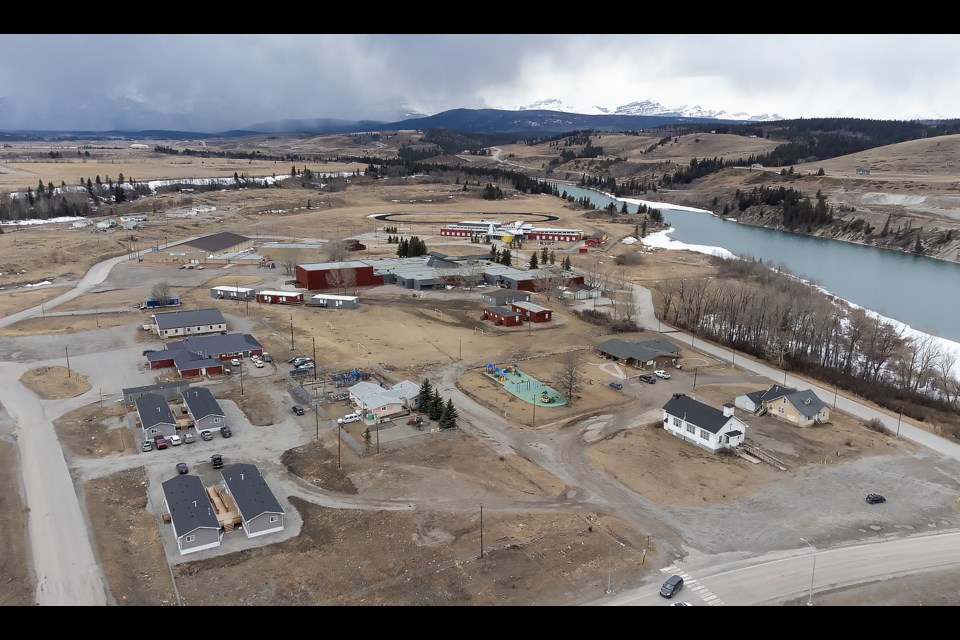ÎYÂRHE NAKODA – A tri-services building housing EMS, fire services – and new to Îyârhe Nakoda First Nation – a proposed hybrid of RCMP and Indigenous tribal police will be built in Mînî Thnî, the only question is where, and is it a change the community wants?
A location off Highway 133, south of the Mînî Thnî townsite has been proposed and approved by Stoney Tribal Council, but local leaders want to hear from the community about plans to move ahead with the facility, with feedback on the policing model.
“The focus of a town hall this week is determining the preferred location of where the new facility will go,” said Nakoda Emergency Services (NES) director Reg Fountain. “We have a duty to consult and we have a duty to report. This is an opportunity to do both.
“It’s a presentation to the Nation members – anybody who thinks they might be impacted by construction on that site. It’s also to tell people what we’ve done to date, which is very, very preliminary and to tell people what we want to do in the future and seek their input.”
The town hall will be hosted at the Mînî Thnî Gymnasium Thursday (Nov. 16) from 1-3 p.m.
Fountain said the Nation has funding arrangements in place for the new facility with Public Safety Canada and Indigenous Services Canada (ISC) and fire services would shift from 12 hours to 24 hours, seven days a week. The total cost of the facility and required staffing changes, however, is not yet known.
The fire hall would be 100 per cent funded by ISC and Stoney Nation would be responsible for EMS facility funding. The policing aspect, Fountain noted, would be funded 52 per cent by the federal government for RCMP and 48 per cent would be funded by the Nation, due to the tribal policing component.
Fountain said NES and the Nation have been working closely with Public Safety Canada as well as officers with Cochrane RCMP and the Stoney Nakoda and Kananaskis satellite detachment, which opened in 2019, to create a hybrid policing model to better respond to the needs of the community.
“The decision for what policing services is required on the Nation is that of tribal council,” said Fountain, noting concern has been voiced regarding RCMP conduct toward Nation members.
“As we become more capable of conducting our own police services, the idea is that it would be a transition from RCMP solely to RCMP coaching and mentoring an Indigenous tribal police force – so that hybrid policing model – and then how far down the road and whether we keep that or not, that’s up to tribal council.”
Fountain said the Nation’s plans to move to a different policing model pre-dates his arrival working with local emergency services, about a year ago. The site for the facility was selected last fall and consultation over the location has been ongoing.
“The agreement that was made by the chiefs with RCMP and Public Safety Canada was before my time and was for the construction of a new RCMP facility that would be dedicated to a detachment, not a satellite detachment, but a detachment on its own,” said Fountain. “In discussion with RCMP, it will be a sergeant-level detachment, so you’re going to be looking at a guaranteed 14-16 RCMP members in that facility.”
The new facility, of which the total square footage is still unknown, would also give officers the ability to do interviews, fingerprint suspects and store police vehicles, among other actions officers currently must travel back and forth to Cochrane for.
Sgt. Mike Eady with Kananaskis and Stoney Nakoda RCMP detachment, said he looks forward to the new, larger facility, which means “more time spent on the Nation and less headaches in the long run” and to more discussion on what a hybrid policing model and resulting restorative justice system might look like.
“From everything I’ve heard, the RCMP is just supportive of whatever the Nations wants to do, and we’ll help them achieve that,” he said.
One of the ideas being tossed around is training the Nation’s protective services security guards to become bylaw officers or police officers, if there is interest. Fountain said the intent would be to employ Nation members to its own police force.
Eady said he looks forward to the town hall discussion, which RCMP will be participating in along with NES staff and invited local leaders.
“I’m excited to get a little bit more in the know as to what the actual plans are, what’s being looked at and what comes to fruition. We’re here to help if it’s decided the community wants its own police service.”
“With this building, we will help build it to spec so that it meets the needs of a police force. We’re just going to be renters in this place.”
The Outlook reached out to Public Safety Canada, ISC and members of Stoney Tribal Council to learn more about the tri-services project, but a response was not received in time for publication.
CORRECTION: A previous version of this article stated the new facility was proposed for construction off Highway 1X but it is proposed for a site off Highway 133. The Outlook apologizes and regrets this error.
The Local Journalism Initiative is funded by the Government of Canada. The position covers Îyârhe (Stoney) Nakoda First Nation and Kananaskis Country.




